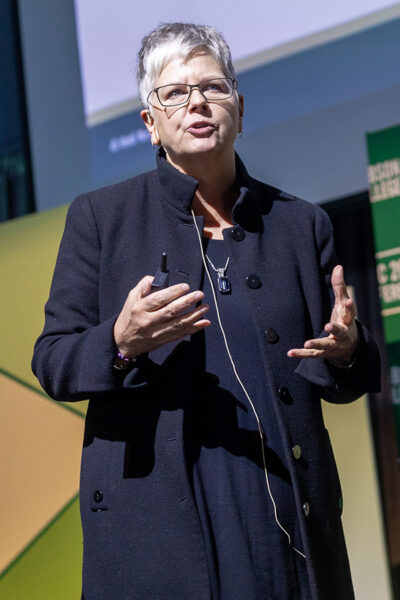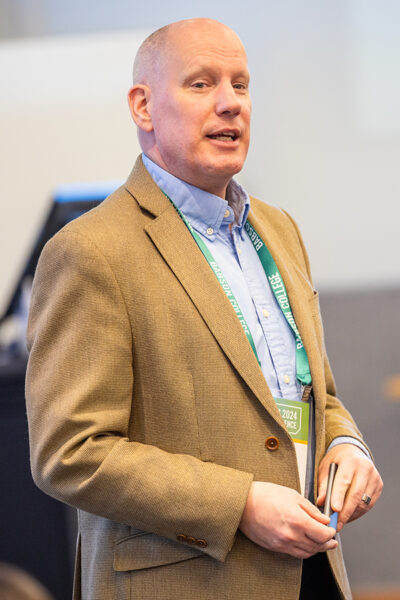Building Resilient and Agile Teams: The Competitive Edge in a Rapidly Changing Market

In a world where disruption and uncertainty have become routine, the ability to adapt isn’t just a professional luxury—it’s essential. Resilience, flexibility, and agility rank among the most critical soft skills for the modern workforce, according to the 2025 Future of Jobs Report by the World Economic Forum.
But, what do these capabilities look like in practice? And, how can organizations develop teams equipped to thrive amid constant change?
How to develop better leaders? Read more about Babson’s groundbreaking research on entrepreneurial leadership.
We asked Babson College experts Heidi Neck and Scott Taylor what it takes to cultivate teams that do more than weather volatility. Neck is the Jeffry A. Timmons Professor of Entrepreneurship and the academic director of Babson Academy, and Taylor is a professor of organizational behavior and the Arthur M. Blank Endowed Chair for Values-Based Leadership at The Arthur M. Blank School for Entrepreneurial Leadership at Babson.
Their insights reveal that while disruption and uncertainty are inevitable, how professionals and leaders respond to it can become a defining competitive edge.
The Power Trio: Defining Resilience, Flexibility, and Agility
Though often grouped together, these capabilities serve distinct but complementary functions:

- Resilience is the ability to bounce back from setbacks and stay grounded during periods of uncertainty.
- Agility is the capacity to adjust quickly and effectively in real time, often without a playbook.
- Flexibility—especially cognitive flexibility—is about being open to new ideas, shifting mental models, and seeing challenges from multiple perspectives.
“The capacity to think entrepreneurially requires resilience,” Neck says. “It means managing through stress and uncertainty—or even thriving under such conditions—because that’s the new norm.”
Taylor echoes that sentiment, noting that resilience isn’t binary. “It’s a muscle. You develop it over time, and it gets stronger,” he says. “But because the context is always changing, you have to find it again and again.”
Some examples of resilience skills in the workplace include adapting to layoffs, recovering from failed product launches, or navigating organizational restructuring with a focus on learning and growth.
Playing Offense in a World of Uncertainty
Why do agility skills, flexibility skills, and adaptability skills matter so much now? Because reactive teams fall behind. Adaptive teams move forward.
“Resilient and agile teams play offense when others are playing defense,” Neck says. “It’s being prepared to benefit from a turnover or fumble, if I may use a sports analogy.”
These teams recover quickly from failure, demonstrate strong agility skills by adjusting to new market realities, and embrace experimentation even without guaranteed outcomes. Taylor notes that agility and resilience are deeply interwoven: “You can’t be truly agile without first building resilience. Resilient teams don’t just survive difficult situations—they adapt, they learn, and they often come out stronger.”
The best way to build resilience skills and agility within a team is to identify entrepreneurial individuals already thriving in ambiguity and create the right conditions for them to lead. Encourage autonomy. Normalize iteration. Make room for learning through failure.

Building resilience skills and agility doesn’t mean launching a new company-wide training initiative. It starts by letting go.
“Get out of the way,” Neck says. “Give them ownership. Don’t confuse management with leadership. Management is about facilitation. Leadership is about influence.”
Taylor reinforces that this is not a one-time event; it’s woven into the company’s culture. Resilience evolves as your team, your environment, and your challenges change. Resilience skills must be actively cultivated and continuously rediscovered.
Flexibility: The Often-Overlooked Ingredient
While resilience skills and agility show up in how teams behave, cognitive flexibility influences how they think. Teams demonstrating flexibility skills can reframe problems, adapt strategies on the fly, and approach decisions from multiple perspectives. It’s what makes smarter, faster decision making possible in the face of the unknown.
Common examples of flexibility skills include adapting to hybrid work environments, shifting project roles mid-stream, or taking on new responsibilities during unexpected absences. These moments reveal not just adaptability, but also the value of cognitive flexibility in fast-moving, ambiguous situations.
What Not to Do: Common Mistakes to Avoid
Many organizations want to build adaptable teams but go about it the wrong way. According to Neck, common missteps include trying to transform everyone at once or relying too heavily on top-down culture change. Often, they default to control-oriented management styles when the situation calls for trust and empowerment.
Instead, Neck recommends finding the intrapreneurs already demonstrating resilience, agility, and flexibility, and supporting them first. Others will follow their lead more authentically than any corporate directive could compel.
There’s No Such Thing as Future-Proof, So Build for Change
Organizations often try to lock in stability for the long haul, but Neck offers a reality check: “Future-proofing is not possible,” she says, “and we are foolish to think otherwise.” Instead, resilience and agility are what set teams up to succeed in unpredictable times.
But, that doesn’t mean organizations can’t prepare.
The best teams don’t obsess over protecting what they have built. They stay focused on building what’s next. “Just keep playing offense,” she says. “Try to enjoy the new game that hopefully your organization created. That’s what entrepreneurial people at all levels in the organization do.”
Key Takeaway
Resilience, flexibility, and agility aren’t just workplace buzzwords. They are the mindset and muscle that teams need to succeed in the face of constant change and unexpected disruption. Building them requires intention, support, and willingness to step back and let teams lead the way.
LEARN MORE about Babson’s Professional and Executive Education portfolio, including live-online, Babson On-Demand™, and blended courses for individuals; leadership development programs for organizations; opportunities for advanced students and educators at Babson Academy; and government leadership programs.
Posted in Insights



